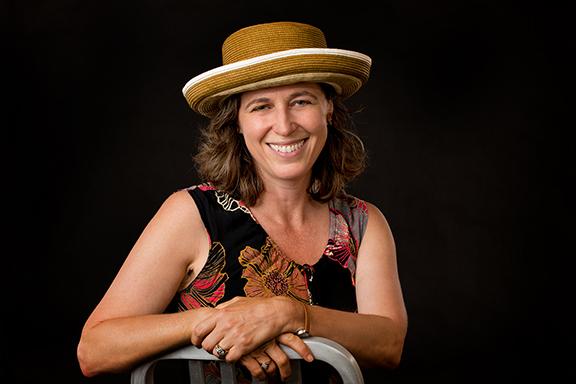
Katz rediscovers 1842 Walt Whitman poem
calendar icon01 Dec 2014
Lincoln, Neb.--Associate Professor of Art History Wendy Katz has rediscovered a new poem by Walt Whitman. While researching art criticism in the penny newspapers, as a Smithsonian Senior Fellow in Washington, D.C., she found a poem in the June 23, 1842, issue of the “New Era,” by “W.W.”The poem, “To Bryant, the Poet of Nature,” addresses William Cullen Bryant, an American romantic poet and editor of the New York Evening Post.
Her recently published article in the Summer/Fall 2014 issue of the “Walt Whitman Quarterly Review,” outlines her reasons for believing the poem was by Whitman.
“The peer review process meant that the editor of the journal and two other scholars felt that the argument was persuasive,” Katz said.
Katz is an art historian. She is researching a book titled “The Politics of Art Criticism in the Penny Press, 1833-1861.” She received a Smithsonian American Art Museum Fellowship to conduct research in Washington, D.C., last spring.
Near the end of her fellowship in May, she was reviewing newspapers in the collection of the Library of Congress.
“I would just go page by page through the issues of the newspapers,” Katz said.
Katz was looking for any kind of art criticism for her own research, but kept an eye out for Whitman.
“He was an art critic, and I actually also found a new piece of art criticism by him,” Katz said. “But my husband, Ken Price, is a Walt Whitman expert, so I always try to spot any references to Whitman.”
The poem in the “New Era” was signed with the initials “W.W.”
“So you have to prove it’s by Whitman,” Katz said. “That’s what the article I wrote for the journal was about, trying to persuade people that it is him.”
Her attribution centers on three arguments: Whitman’s initials, his poetics both prior to and after his writing of “Leaves of Grass,” and his relationship to editors of political presses during this time.
Through her research, she knew of Whitman’s connections to not only Bryant, but Parke Godwin, Bryant’s son-in-law and the editor of the “New Era” at the time Whitman’s poem was published. Whitman himself edited and wrote for other Democratic-leaning penny papers.
“It seems clear to me that they all knew each other and were writing for each other’s papers,” Katz said.
Whitman also had a personal connection to Bryant.
“Whitman later recalled going for long walks with Bryant, so they were more than just political and journalistic acquaintances,” Katz said.
In looking at the poem, Katz said it may not immediately seem like Whitman because it’s not like “Leaves of Grass,” Whitman’s famous poetry collection published in 1855.
“It was written almost 15 years before ‘Leaves of Grass,’ his monumental achievement where he experimented with verse,” Katz said. “So it’s a pretty conventional-seeming poem.”
But Whitman continued to write newspaper poetry throughout his life.
“And of course, it paid, unlike ‘Leaves of Grass,’” Katz said. “And his newspaper poetry was always more conventional. I was struck, though, by the way he comes back again and again in these poems to this theme that the physical monuments we build to elevate people and give them fame are not satisfactory. In a republic, the marker of a great man or woman must be that their achievements have elevated everyday life.”
Katz said more Whitman poems in periodicals might be discovered.
“Whitman is a well known enough figure that people certainly have pored over the records. There won’t be huge discoveries,” she said. “But I wouldn’t be surprised if more miscellaneous poetry does turn up. One of the projects here at UNL in the Center for Digital Research in the Humanities is coming up with a way of searching for poetry in newspapers, and I suspect that devices like that, unlike my flipping pages one by one, will eventually find more poems.”
To Bryant, the Poet of Nature.
Let Glory diadem the mighty dead—
Let monuments of brass and marble rise
To those who have upon our being shed
A golden halo, borrowed from the skies,
And given to time its most enduring prize;
For they but little less than angels were:
But not to thee, oh! nature’s OWN, we should
(When from this clod the minstrel-soul aspires
And joins the glorious band of purer lyres)
Tall columns build: thy monument is here—
For ever fixed in its eternity—
A monument God-built! ‘Tis seen around—
In mountains huge and many gliding streams—
Where’er the torrent lifts a melancholy sound,
Or modest flower in broad savannah gleams.
--W.W., “New Era,” June 23, 1842.